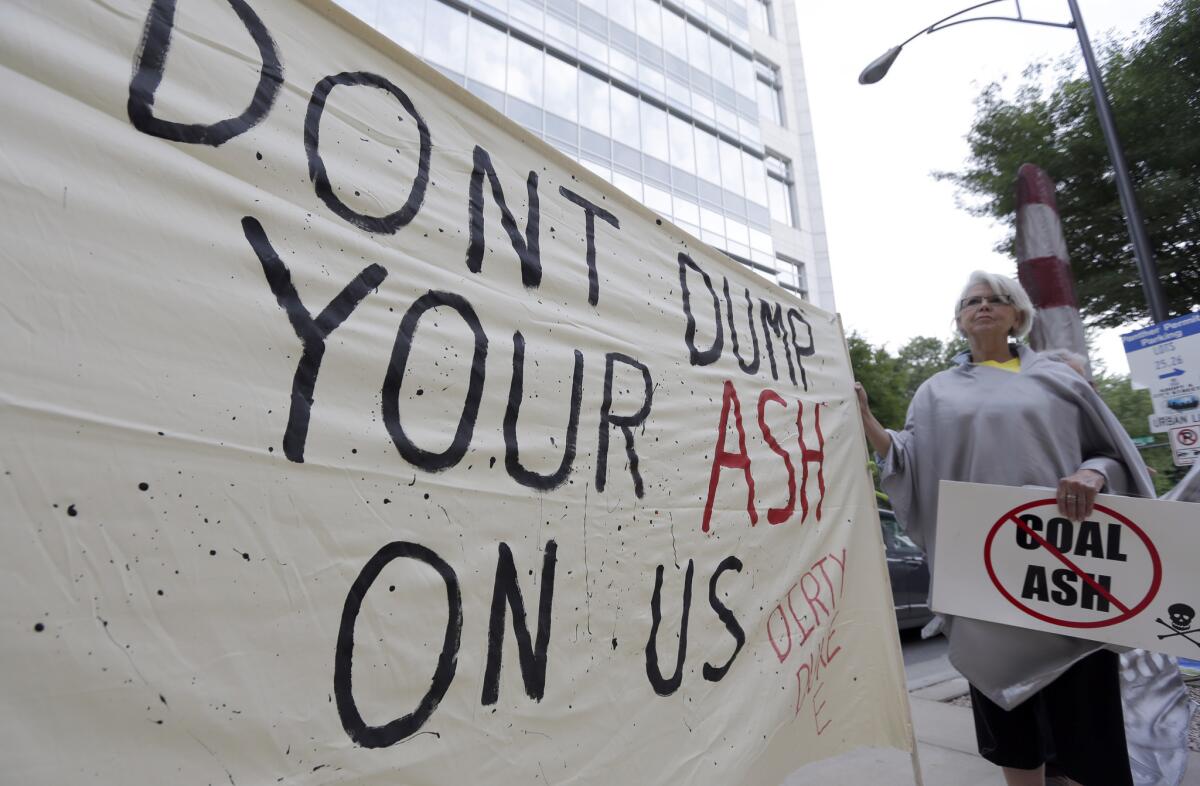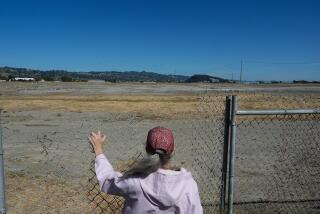After Duke guilty verdict, fears and questions linger about coal ash

Debbie Hall of Sanford, N.C., protests May 7 outside Duke Energy headquarters before the company’s shareholders meeting in Charlotte, N.C. Hall and other North Carolina residents worry about possible pollution from ponds the company uses to store coal ash.
Reporting from Greenville, N.C. — Duke Energy may have been hauled into federal court and smacked with a $102-million penalty for polluting North Carolina rivers with potentially toxic coal ash, but that didn’t do much for the tainted well water at Barbara Morales’ house.
Morales, 67, lives on fixed income in Belmont, just west of Charlotte. From her home, she can see Duke Energy’s Allen electric station on the Catawba River. Her well is a few hundred feet from two coal ash basins there.
Morales is one of at least 123 North Carolina residents who have received letters from state health and environmental officials warning them that their well water is contaminated and unsafe for drinking or cooking.
Morales said she hasn’t used her water since testing by an environmental group a year ago found elevated levels of dangerous compounds. Last week, Duke began delivering bottled water to her home – a gallon a day for each of the three people living there.
But neither the bottled water nor Duke’s guilty plea Thursday to polluting four rivers, including the Catawba, gives Morales much hope that her well will be restored.
“Duke just won’t admit their coal ash is poisoning my water,” she said. “They need to take responsibility.”
The predicament for Morales and others living near Duke’s 32 coal ash ponds in North Carolina is just one measure of the potential threat posed by 108 million tons of coal ash stored in the state in leaky pits, also called ponds, basins or lagoons.
Duke pleaded guilty Thursday to nine misdemeanor violations of the Clean Water Act, but environmentalists say the conviction does not require the utility to clean up coal ash ponds that still threaten waterways, wetlands and groundwater.
“These fines do not clean up that mess,” said John Suttles, a lawyer with the Southern Environmental Law Center, which has sued the utility over coal ash.
Morales contends that her water was poisoned by coal ash. But Duke Energy says substances detected in testing can occur naturally, and the state environmental agency says many of the compounds “may be naturally occurring or unrelated to coal ash ponds.”
Duke is paying for state tests of wells within 1,000 feet of coal ash ponds. But so far, according to Erin Culbert, a company spokeswoman, “we have no indication that Duke Energy plant operations have influenced neighbors’ well water.’’
Culbert said Duke would consider extending municipal water lines to affected residents if testing shows neighbors’ wells have been influenced by plant operations.
The state is testing wells for about 30 substances and heavy metals associated with coal ash, including arsenic, chromium, lead, mercury and hexavalent chromium. Some of the substances can cause cancer or serious health complications at certain levels of exposure.
Morales said she had her water tested by the environmental group after a massive coal ash spill in February 2014 dumped up to 39,000 tons of coal ash and 27 million gallons of ash slurry from a Duke containment pond and coated the Dan River with thick sludge for 62 miles.
The spill — the third-largest in U.S. history — prompted a federal investigation that resulted in Duke’s guilty pleas. Duke, the nation’s largest electric utility, was convicted of illegally dumping coal ash or coal ash waste water into rivers and failing to maintain coal ash treatment equipment.
Coal ash’s threat to the environmental was underscored by the $24-million community service fee Duke is required to pay to the National Fish and Wildlife Foundation to protect ecosystems in North Carolina and Virginia. Duke’s plea deal also requires the company to pay $10 million for wetlands protection to help offset the long-term environmental damage of its coal ash ponds.
That money, along with a $68-million criminal fine, will come from Duke shareholders, not customers. The fine was the second-largest under the Clean Water Act, according to environmental groups.
Duke Energy had revenue of $23.9 billion and profit of $1.9 billion last year.
The Dan River spill also prompted North Carolina legislators to pass a law that requires Duke to close four of its most vulnerable coal ash ponds by 2019 and the rest by 2029. The ash must be stored in dry, lined pits that are regularly monitored. The law also requires the testing of wells near coal ash ponds.
But in addition to the potential coal ash threat to wells, Duke has reported nearly 200 seeps of coal ash in the state. Environmentalists said the plea deal does not require the company to stop the seeps, which release 3 million gallons of coal ash water a day.
Over a nine-day period, said Suttles, the environmental lawyer, the amount released by the 200 seeps would equal the amount of coal ash released during the Dan River spill. Pete Harrison, an attorney with Waterkeeper Alliance, a national environmental group, said Duke “is trying to legalize those leaks.”
A spokesman for the state Department of Environment and Natural Resources said waste water permits at the 14 Duke plants containing the 32 coal ash ponds are being modified “to ensure that all discharges, including seeps, are properly monitored and sampled to ensure the protection of water quality.”
Paige Sheehan, a Duke spokeswoman, said the permit process is a temporary measure while the company works to safely close ash basins. “Ultimately, the way to address it is to close the basins and that’s what we’re focused on,” she said.
A 62-page plea agreement, known as a joint factual statement, said seeps are common in the earthen dams used to contain Duke’s coal ash. The seeps contain “dissolved chemical constituents” and “may transport pollutants,” the federal court document said.
The document said Duke did not begin keeping detailed information on the seeps, which have leaked into rivers, until after the Dan River spill. It said Duke illegally dumped coal ash waste water, including ash from seeps, into the Catawba River from Duke’s Riverbend plant in Gaston County.
Morales lives in Gaston County, and the presence of coal ash seeps worries her. But more worrying is the contamination of her well water, with no indication that it will be safe to drink any time soon.
“The bottled water is a short-term solution,” she said. “I still can’t use my well water. Even when I boil it, it leaves a terrible residue in the pot.”
Morales keeps an eye on the coal ash ponds at Duke’s Allen plant next to her home.
“What happens if there’s a big coal ash leak into the Catawba River?” she asked. “What do I do then?”
Twitter: @davidzucchino
More to Read
Sign up for Essential California
The most important California stories and recommendations in your inbox every morning.
You may occasionally receive promotional content from the Los Angeles Times.











